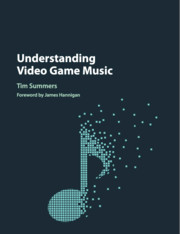Book contents
- Frontmatter
- Dedication
- Contents
- List of Figures, Musical Examples and Tables
- Foreword
- Acknowledgements
- Introduction: Beyond the Candelabrum
- PART I ANALYSING VIDEO GAME MUSIC
- PART II CRITICAL PERSPECTIVES
- Epilogue: Fun, Play and Music
- Appendix: How to Hear a Video Game: An Outline
- Bibliography
- Ludography
- Index of Games
- General Index
Introduction: Beyond the Candelabrum
Published online by Cambridge University Press: 05 September 2016
- Frontmatter
- Dedication
- Contents
- List of Figures, Musical Examples and Tables
- Foreword
- Acknowledgements
- Introduction: Beyond the Candelabrum
- PART I ANALYSING VIDEO GAME MUSIC
- PART II CRITICAL PERSPECTIVES
- Epilogue: Fun, Play and Music
- Appendix: How to Hear a Video Game: An Outline
- Bibliography
- Ludography
- Index of Games
- General Index
Summary
It is traditional for books about music to begin with a pithy quotation or an endearingly humorous anecdote to elucidate the central thesis of the volume. There will be a few anecdotes and many more quotations to come, but for this book on a non-traditional popular music, it is appropriate that I buck the trend and instead offer something in the modern aphoristic vernacular: an internet cartoon (Figure 0.1).
David Soames's ‘The Ultimate Combo’ still brings a smile to my face, even after years of familiarity with the cartoon, since, like all of the best jokes, it mischievously suggests more than it explicitly states. Soames's illustration satirizes the ‘combo’ – a phenomenon (particularly prevalent in fighting games) whereby players may deploy a particular sequence of commands in quick succession to increase the cumulative effect of the avatar's attacks. The fighter in the cartoon is thus able to produce progressively more elaborate assaults upon the unseen opponent, to the point of conjuring a fireball. In the fourth and final line of the cartoon, however, this complexity, comically ad absurdum, has been translated into a rather more benign manifestation.
Why should the last line of the cartoon link music and video games? And, furthermore, why is this funny? It might be the case that part of the humour comes from an implied linguistic pun. In English, amongst other languages, the word ‘play’ is used both when describing the action of performing using a musical instrument and for engaging with video games. Perhaps ‘The Ultimate Combo’ is linking the two senses of the word ‘play’ through deploying a pun – what Arthur Koestler described as ‘two strings of thought tied together by an acoustic [or homographic] knot’. But maybe these are not actually quite so separate meanings of the word ‘play’. Unlike, for example, the famous pun-based exchange in Airplane! (1980), ‘Can you fly this plane and land it?’/‘Surely you can't be serious?’/‘I am serious, and don't call me Shirley,’ this case of ‘play’ is not a homograph or homophone, but the same word, common to two different but related activities. ‘The Ultimate Combo’ suggests that there are not hard and fast constitutional differences between the play of music and the play of video games as we might imagine.
- Type
- Chapter
- Information
- Understanding Video Game Music , pp. 1 - 10Publisher: Cambridge University PressPrint publication year: 2016



